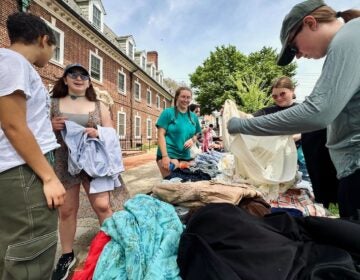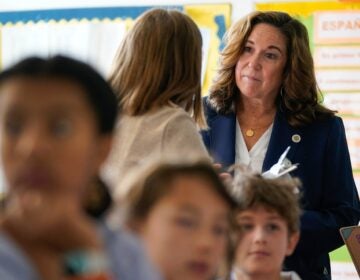Tea Party talk takes over 2nd night of candidate debates at University of Delaware
Lots of T words (tea party and term serving) were thrown around during the second night of debates at the University of Delaware. Lieutenant Governor Matt Denn squared off against republican candidate Sher Valenzuela followed by Governor Jack Markell and republican candidate Jeffrey Cragg.
The candidates talked about many of the same big issues they’ve been touting throughout this election season.
In the lieutenant governor race, Valenzuela and Denn started off the debate talking about business and the state budget.
Denn said the state is working with businesses to figure out what they need to succeed in Delaware.
“They want the size of the government to be small because they want their taxes to be as low as possible,” said Denn. “We reduced the size of executive branch of state government by more than any administration in history and businesses like that because they can see that we’re trying to keep the cost of government down so their taxes will be lower.”
Valenzuela stated that the biggest obstacle for small business is regulation.
“It’s not about reducing the size of state government, although surely we don’t want to see government increase in size, a smaller more effective government is definitely the approach we would seek to have. It’s the regulatory environment. We are 44th in the nation when it comes to being small business friendly.”
When it came to the state budget, Valenzuela argued that there is too much spending which hurts businesses and taxpayers and said there are areas where state could be more efficient.
“I think we have all kinds of opportunities in state government, certainly in the state of Delaware, to trim fraud, to trim abuse and to trim what we can look at as being opportunities to trim what we’re doing in terms of spending and not look at businesses and taxes as being the fuel for that engine.”
Denn defended the state’s budget stating that they don’t have a deficit and are able to work efficiently with what they’ve got.
“I’m very proud of the fact that we were able to reduce the executive branch payroll by 400 people and we did it without layoffs, without an expensive buyout programs. We did it with careful management of our cabinet agencies and I think it’s been a good thing for the state. It’s allowed us to keep taxes lower and it’s allowed us to make important investments in things like early childhood education.”
The debate got heated when the candidates were asked about the succession plans and if they felt they could take over as governor. Denn sited Valenzula’s relationship with the Tea Party as a reason she wouldn’t be fit.
“I don’t think Delaware wants a Tea Party governor and I think that’s an important thing that people need to consider when they’re thinking about who to vote for as lieutenant governor,” said Denn.
Valenzula responded by affirming that although she spoke to Tea Party and Independent groups, she is a republican candidate and alluded that she would be more efficient than Denn as lieutenant governor.
“In terms of what I’d do,” said Valenzuela regarding being lieutenant governor, “I would do this 110 percent. Matt Denn, for the past four years, has taken a full time salary for working part-time on full time challenges that we have in the state of Delaware.”
In the governor debate, Governor Jack Markell and Jeffrey Cragg talked about the issue of jobs in Delaware and finding ways to put people back to work.
Markell said the state is working effectively with companies to add jobs and listed several examples of how the state is working on the state’s unemployment issue.
“The facts are, JP Morgan Chase is adding 1,200 jobs, Amazon is building a one-million square foot distribution facility and they’ll be putting a thousand people to work there,” said Markell. “Bloom Energy is building a new facility where they’ll be employing hundreds.”
According to Cragg, that’s not enough for the 30,000 unemployed residents in the state of Delaware.
“There’s another 18,000 who are underemployed, said Cragg. “People are taking part time jobs, people are working multiple jobs and people are taking a job and not using their education.”
Denn said the state needs to create a more stable business environment for businesses to grow.
The candidates also had a lively discussion on entitlements such as health care and who ultimately foots the bill.
“So many of the entitlements are at the federal level, said Markell. “The important one here is Medic Aid. I think it’s of important interest to the people in Delaware to expand Medic Aid under the Affordable Care Act. Number one, 20-30 thousand more people will be covered and number two, higher reimbursement from the federal government.”
Markell argued that more people insured under Medic Aid would mean less uninsured people going to emergency rooms, lowering the burden for taxpayers.
Cragg opposed the idea, saying the increase in Medic Aid will still be paid for by taxpayers.
“One of the reasons Jack is so excited about expanding the Medic Aid population is because the federal government is going to pay for the bulk of it,” said Cragg. “But, we all pay for it too. It’s an expansion of an entitlement program on the federal level that the state government is riding.”
Cragg also hit Markell once again to make a pledge to serve out his term if elected and not take a job in the 2nd term of an Obama term if the president is re-elected. “I look forward to serving the next four years as governor,” Markell said.
The debates were moderated by Nancy Karibjanian, vice president of Delaware First Media and former WHYY anchor, now a University of Delaware instructor and David Wilson, associate professor in the department of Political Science and International Relations at the University of Delaware.
WHYY is your source for fact-based, in-depth journalism and information. As a nonprofit organization, we rely on financial support from readers like you. Please give today.




